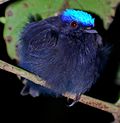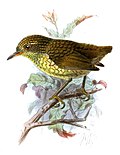| Lepidothrix | |
|---|---|

| |
| Velvety manakin | |
| Scientific classification | |
| Domain: | Eukaryota |
| Kingdom: | Animalia |
| Phylum: | Chordata |
| Class: | Aves |
| Order: | Passeriformes |
| Family: | Pipridae |
| Genus: | Lepidothrix Bonaparte, 1854 |
| Type species | |
| Pipra cyanocapilla = Lepidothrix coronata Hahn, 1826 | |
| Synonyms | |
|
Neolepidothrix Paclt, 2009 | |
Lepidothrix is a genus of passerine birds in the manakin family Pipridae. Birds in the genus are predominantly found in South America, but one species, the velvety manakin, also ranges into Central America. The females of this genus have green plumage with yellow bellies, as do some of the males. The remaining males have black plumage with white or blue crowns. Some also have yellow bellies or blue rumps.
Taxonomy
The genus Lepidothrix was introduced by the French naturalist Charles Lucien Bonaparte in 1854. The type species was subsequently designated as the blue-capped manakin. The name Lepidothrix combines the Ancient Greek words λεπις lepis, λεπιδος lepidos "scale, flake" and θριξ thrix, τριχος trikhos "hair". A new genus name Neolepidothrix, was proposed in 2009 due to a suggestion that it was a junior homonym of the extinct silverfish Lepidotrix, however it was later shown that the original spelling of the silverfish genus was not same, so therefore the genera were not homonymous.
The genus contains nine species:
| Image | Scientific name | Common Name | Distribution |
|---|---|---|---|
 |
Lepidothrix velutina | Velvety manakin | Colombia, Costa Rica, Ecuador, and Panama |
 |
Lepidothrix coronata | Blue-capped manakin | Bolivia, Brazil, Colombia, Ecuador, Peru, and Venezuela |
| Lepidothrix suavissima | Orange-bellied manakin | southern Venezuela, far northern Brazil, and central Guyana | |
 |
Lepidothrix serena | White-fronted manakin | Surname and French Guiana |
 |
Lepidothrix iris | Opal-crowned manakin | Brazil |
 |
Lepidothrix vilasboasi | Golden-crowned manakin | Brazil |
 |
Lepidothrix nattereri | Snow-capped manakin | Amazon Basin of Brazil and far north-eastern Bolivia |
 |
Lepidothrix isidorei | Blue-rumped manakin | Colombia, Ecuador, and Peru |
| Lepidothrix coeruleocapilla | Cerulean-capped manakin | Peru |
References
- "Pipridae". aviansystematics.org. The Trust for Avian Systematics. Retrieved 2023-07-24.
- Paclt, Jiří (2009). "Neolepidothrix, a replacement name for Lepidothrix Bonaparte (Aves, Pipridae), nec Menge (Insecta, Lepidotrichidae)". Zoosystematics and Evolution. 85 (1): 161. doi:10.1002/zoos.200800022.
- Zuccon, D. (2011). "The case of Lepidothrix, Lepidotrix and Neolepidothrix: the importance of the original literature in taxonomic decisions". Zoosystematics and Evolution. 87 (2): 379–382. doi:10.1002/zoos.201100015.
- Snow, D. W. (2004). Family Pipridae (Manakins). Pp. 110-169 in: del Hoyo, J., Elliott, A., & Christie, D. A. eds (2004). Handbook of the Birds of the World. Vol. 9. Cotingas to Pipits and Wagtails. Lynx Edicions, Barcelona. ISBN 84-87334-69-5
- Bonaparte, Charles Lucien (1854). "Conspectus Volucrum Anisodactylorum". L'Ateneo Italiano. Raccolta di Documenti e Memorie Relative al Progresso delle Scienze Fisiche. 2 (11): 311–321 .
- Dickinson, E.C.; Christidis, L., eds. (2014). The Howard & Moore Complete Checklist of the Birds of the World. Vol. 2: Passerines (4th ed.). Eastbourne, UK: Aves Press. p. 9. ISBN 978-0-9568611-2-2.
- Jobling, J.A. (2018). del Hoyo, J.; Elliott, A.; Sargatal, J.; Christie, D.A.; de Juana, E. (eds.). "Key to Scientific Names in Ornithology". Handbook of the Birds of the World Alive. Lynx Edicions. Retrieved 27 June 2018.
- Zuccon, Dario (September 2011). "The case of Lepidothrix, Lepidotrix and Neolepidothrix: the importance of the original literature in taxonomic decisions". Zoosystematics and Evolution. 87 (2): 379–382. doi:10.1002/zoos.201100015.
- Gill, Frank; Donsker, David, eds. (2018). "Cotingas, manakins, tityras, becards". World Bird List Version 8.2. International Ornithologists' Union. Retrieved 27 June 2018.
| Taxon identifiers | |
|---|---|
| Lepidothrix | |
This Pipridae-related article is a stub. You can help Misplaced Pages by expanding it. |
